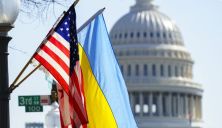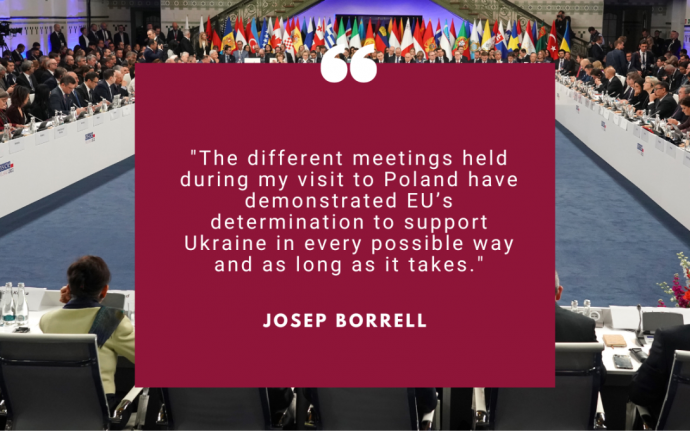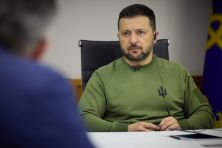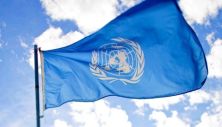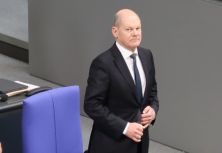Nineteen years ago, I came to Lodz to participate in a debate ahead of the referendum on Poland’s accession to the EU. Last Wednesday, I was again in this city to participate in the ministerial meeting of the Organization for Security and Cooperation in Europe (OSCE).
This organization was created during the Cold War, in the wake of the Helsinki agreement of 1975, to ensure early warning, conflict prevention, crisis management and post-conflict rehabilitation. Since almost fifty years, with its today 57 participating countries, it has played a very significant role to preserve a relatively stable European peace order, despite various conflicts and crises.
OSCE in jeopardy due to Russian aggression
Since 24 February, the Russian aggression against Ukraine has put this architecture in jeopardy. Last year, during the OSCE Ministerial Council in Stockholm in December 2021, the focus was how to reengage Russia in the dialogue on the European security architecture. This year, the attention has been on how to continue the multilateral engagement despite the current stalemate after Russia’s aggression against Ukraine.
The Polish government decided not to grant visa to the Russian foreign affairs minister Lavrov to attend the OSCE meeting. This spared him from witnessing a widespread condemnation of Russia’s behaviour. As many other participants I stated during the plenary meeting that Russia has flouted not only the specific Organisation for Security and Cooperation in Europe (OSCE) commitments, but also violated the core principles on which European security is built.
Turning its aggression into a purely punitive campaign, Russia is trying to inflict as much pain as possible on Ukrainians, using winter as a weapon to put them into darkness and cold.
After failing to invade Ukraine, the Russian army is now deliberately targeting energy and water infrastructure on which normal Ukrainian citizens rely. Turning its war of aggression into a purely punitive campaign, Russia is trying to inflict as much pain as possible on Ukrainian citizens, using winter as a weapon to put them into darkness and cold. It constitutes clearly an additional war crime. There can be no respect of the OSCE values as long as Russia continues its war of aggression against Ukraine with Belarus’ complicity.
Russia has not joined the consensus on the extension of the Special Monitoring Mission to Ukraine. However, the OSCE Secretary General launched a new extra-budgetary Support Program for Ukraine in November to ensure continued OSCE presence. I announced that the EU will support this program with € 1.2 million to help further demining Ukraine.
Furthermore, the OSCE budget for 2022 and 2023 has not been approved and the organization has to work on the basis of monthly allotments. Despite these issues, the Moscow Mechanism, dedicated to send missions of experts to assist participating States, has been used three times already in 2022 (twice on Ukraine and once on Russia). Its reports provided a wealth of evidence on violations of international humanitarian law and human rights by Russian invasion forces.
We have to work creatively to ensure that OSCE remains capable of actions and fulfils as much of its functions as possible.
North Macedonia will take over the chair of the OSCE from Poland in 2023, and I met my colleague, Foreign Minister Bujar Osmani on that issue. We discussed how the OSCE could remain a useful multilateral framework despite the major obstacles created by Russia’s flagrant violation of the Helsinki and UN Charters. As EU, we continue to see this organization as a major building stone of the European security architecture and the OSCE will continue to receive our political and financial support. We have to work creatively to ensure that it remains capable of actions and fulfils as much of its functions as possible.
I used also the opportunity of this OSCE meeting to meet my colleagues from Azerbaijan and Armenia to help deescalate the tensions between the two countries and discuss the future of our EU monitoring capacity (EUMCAP) mission deployed since October in the region.
Russia’s accountability issue
I participated also with my colleague and friend Ukrainian Foreign Minister Dmytro Kuleba to a side event on “Ending Russia’s Impunity and Delivering Justice for Victims”. The EU is fully engaged with Ukraine and international partners to ensure accountability for crimes committed in Russia’s war against Ukraine. That is why, together with the European Commission, I presented recently a proposal to the member states along three work strands.
The EU is fully engaged with Ukraine and international partners to ensure accountability for crimes committed in Russia’s war against Ukraine.
First, we are supporting the International Criminal Court’s (ICC) central role in investigating the war crimes and crimes against humanity. All those who have seen the horrors of Bucha and elsewhere, know these are the gravest of crimes and I pay tribute to the work already done by the ICC Chief Prosecutor.
Secondly, we are providing support to the Office of the Prosecutor General of Ukraine, on the collection of evidence, training of investigators. We do this through our representation, the EU Advisory Mission Ukraine, Eurojust and the Atrocity Crimes Advisory Group (ACA).
Thirdly, we are ready to support Ukrainian efforts to ensure accountability for the crime of aggression. The EU, together with Ukraine and international partners, and in full coherence with the action of the ICC, will work to support the establishment of a special tribunal to investigate and prosecute the crime of aggression as President Zelenskyy has called for. This tribunal must have the backing of the UN and the broadest support of the UN membership.
The EU, together with Ukraine and international partners will work to support the establishment of a special tribunal to prosecute the crime of aggression, as President Zelenskyy has called for.
Accountability requires also Russia to pay for the damages caused to Ukraine and the Ukrainian people. To date, EU Member States have frozen approximately 19 billion Euros of assets belonging to Russian oligarchs and others supporting President Putin. Approximately 300 billion Euros of Russian Central Bank reserves have been blocked. While “frozen” and “blocked” does not mean “confiscated”, we will explore legal avenues to make sure that Russia will effectively pays for the reconstruction of Ukraine. There are already precedents with for example the seized assets of the Central Bank of Afghanistan used to compensate the victims of the 9/11 attacks.
After the OSCE Meeting in Lodz, I went to Warsaw to meet the Polish Minister of Defence Błaszczak. To him, I expressed our gratitude for all the efforts Poland is doing in support of Ukraine.
In Warsaw, I also spoke at the Polish Institute of International Affairs (PISM), the leading Polish foreign policy think tank, on EU support to Ukraine. When I am on mission, I want to use any opportunity to meet civil society actors or to exchange with think tankers and researchers. This is essential both to get an idea of what is really going on in a society and to explain what we are doing, including the difficulties we encounter.
We had a lively discussion with Director Slawomir Dębski and a group of professors and researchers about the causes and the geopolitical consequences of the war. I passed a strong message on how decided the EU is to support Ukraine to recover its territorial integrity and the political work needed to keep the support of the European society.
The new EU military assistance mission
On Friday morning, I travelled to Brzeg, near Wroclaw, to visit one of the training centre of the brand new EU Military Assistance Mission (EUMAM) Ukraine, two weeks after it was launched.
Anyone familiar with European decision-making processes will appreciate the speed with which this mission was put in place. I proposed its creation during the informal Defence Ministerial meeting on 30 August. Following intense negotiations, EUMAM was decided on 17 October. It was launched officially on 15 November and was operational on 30 November, only 15 days after.
Anyone familiar with European decision-making will appreciate the speed with which the new EU military mission to train Ukrainian soldiers was put in place.
With the Combined Arms Training Command Commander, Major General Piotr Trytek, I witnessed some of the ongoing training activities of Ukrainian sappers. I exchanged with the Ukrainian troops and their trainers, among them British and Canadians officers.
It is difficult to talk to soldiers, which are being trained to go to war, risking their lives. We use to say that Ukrainian soldiers are not only defending their country but also the values we believe in. And that’s true. But, they need not only our applause for their determination and courage, they need above all more support to defend their homeland and its territorial integrity, as long as it takes. I thanked Poland for being at the forefront of the EU support to Ukraine and for hosting the EUMAM mission, an important way to provide this support.
Ukrainian soldiers need not only our applause for their courage; they need above all more support to defend their homeland, as long as it takes.
Our mission will train 15 000 Ukrainian soldiers with a budget of € 107 million for its initial two year mandate. Training will be conducted in different EU countries: 24 member states have put forward over 100 offers for training modules, which are currently under review to ensure they match Ukrainian needs. As of today, fifteen modules are ongoing with 1125 Ukrainian soldiers and nine modules have already been completed with 377 soldiers.
The last few days in Poland have been particularly intense. But this effort has been useful to demonstrate once again our determination to support Ukraine in every possible way.
